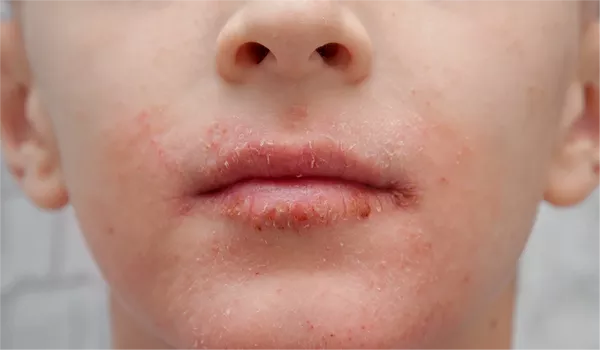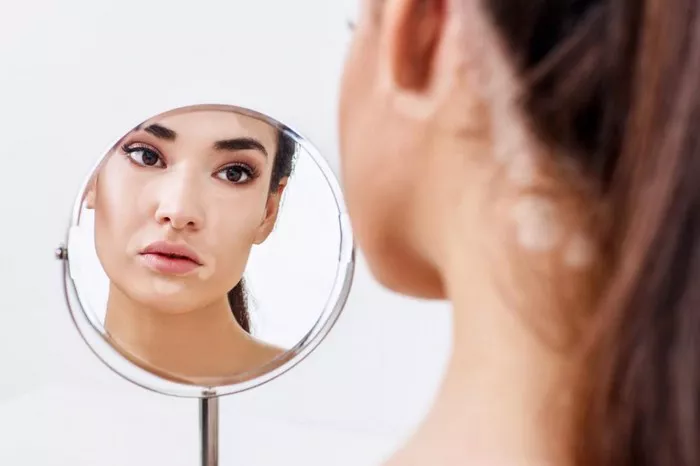Eczema is a common skin condition that can cause red, itchy, and inflamed patches of skin. When it appears on the face, it can be particularly bothersome because of its visible nature. If you’re wondering whether you might have eczema on your face, this article will help you understand the signs, symptoms, and how to confirm your suspicions. We will also cover how eczema on the face is treated and what triggers it.
What Is Eczema?
Eczema, also known as atopic dermatitis, is a condition where the skin becomes inflamed and irritated. It often causes redness, dryness, flakiness, and itching. Although eczema can occur anywhere on the body, it is common for it to appear on the face, especially around the eyes, mouth, and forehead. The exact cause of eczema is not fully understood, but it is believed to be related to an overactive immune system response, genetics, and environmental factors.
Common Signs of Eczema on the Face
Recognizing eczema on the face can be challenging, as the symptoms often resemble other skin conditions. However, there are several key signs to look out for. These include redness, dryness, swelling, and scaling.
Redness and Inflammation One of the primary signs of eczema is redness in the affected area. If you have eczema on your face, the skin may become inflamed and appear blotchy or irritated. This redness is often accompanied by swelling, which can make the skin feel puffy and tender.
Dryness and Flaking Eczema on the face can make the skin dry, rough, and flaky. You may notice that your skin feels tight, especially after washing your face. In some cases, the skin might crack or peel, leading to additional irritation. Dryness is a common feature of eczema because the skin barrier becomes compromised, losing moisture.
Itching Itching is one of the most frustrating symptoms of eczema. If you have eczema on your face, you might feel a persistent need to scratch, which can make the condition worse. Scratching can also cause the skin to break, leading to bleeding and possible infection.
Scaly Patches Eczema can cause the skin to develop thick, scaly patches. These patches may appear as rough, dry areas that feel coarse to the touch. In severe cases, the scales can become crusty or flaky. This is most common around the eyes, nose, and mouth.
Blisters and Oozing In more severe cases of eczema, small blisters may form on the skin. These blisters can ooze a clear or yellowish fluid and cause the skin to crust over. This is particularly common in more aggressive forms of eczema, such as dyshidrotic eczema, which can appear on the face as well as other areas of the body.
Darkening or Lightening of Skin After an eczema flare-up, the skin may change color. This is called post-inflammatory hyperpigmentation (darkening) or hypopigmentation (lightening). The affected area may appear darker or lighter than the surrounding skin even after the rash has healed. This change in skin color is not permanent but can last for several months.
Where Does Eczema Appear on the Face?
Eczema on the face can appear in various areas, but it is most common around the following spots:
Around the Eyes The skin around the eyes is thinner and more sensitive, making it a prime location for eczema. You might notice redness, dryness, and swelling around the eyelids, under the eyes, or in the inner corners of the eyes. This area is particularly prone to irritation, especially if you use makeup or skincare products that trigger eczema.
On the Forehead The forehead is another area where eczema often appears. You might see dry, red patches of skin that are rough to the touch. In some cases, eczema on the forehead can cause the skin to peel or crack, making it look uneven.
Around the Mouth The skin around the mouth can also be affected by eczema. This can lead to dry, irritated skin, and can sometimes cause cracks at the corners of the mouth, which is particularly painful. Eczema around the mouth is often triggered by allergens or irritation from food or skincare products.
On the Cheeks Eczema can appear on the cheeks, often causing a patchy, red rash. The cheeks are more susceptible to environmental triggers like temperature changes, pollution, or allergens, which can aggravate eczema in this area.
What Triggers Eczema on the Face?
While the exact cause of eczema is not known, several factors can trigger flare-ups. Understanding these triggers is important for managing the condition and preventing further irritation.
Environmental Factors Changes in weather, such as cold, dry air in the winter or heat and humidity in the summer, can trigger eczema flare-ups. Exposure to allergens like dust mites, pollen, or pet dander can also irritate the skin.
Skin Care Products Certain skincare products, such as those containing fragrances, dyes, or alcohol, can irritate the sensitive skin on your face. Be mindful of the ingredients in your makeup, lotions, and cleansers. If you notice that your eczema gets worse after using a particular product, it may be best to avoid it.
Food Allergies Some people with eczema may have food allergies that can trigger or worsen their condition. Common food triggers include dairy, nuts, eggs, soy, and wheat. If you suspect that a food allergy is contributing to your eczema, consider eliminating the suspected food from your diet and consult a doctor for testing.
Stress Stress is a known trigger for eczema flare-ups. Emotional stress can cause the body to release certain hormones that can make the skin more reactive, leading to irritation and inflammation. Managing stress through relaxation techniques or regular exercise can help reduce flare-ups.
Infections Skin infections, such as bacterial or fungal infections, can worsen eczema. When the skin barrier is weakened by eczema, it becomes more susceptible to infections. If you notice pus, oozing, or an increase in redness, it may be a sign of infection.
How to Confirm If You Have Eczema on Your Face
If you suspect that you have eczema on your face, it’s important to see a healthcare provider for an accurate diagnosis. A dermatologist will evaluate your symptoms, review your medical history, and may perform tests if necessary. They might take a sample of the affected skin to rule out other conditions, such as fungal infections or psoriasis, which can have similar symptoms.
Treatment Options for Eczema on the Face
If you’re diagnosed with eczema on your face, there are several treatment options to help manage the condition and reduce flare-ups.
Topical Steroid Creams Doctors often prescribe corticosteroid creams to reduce inflammation and redness. These creams help calm the immune response and relieve itching. However, they should be used under a doctor’s supervision because long-term use can cause side effects, especially on the delicate skin of the face.
Moisturizers Regularly moisturizing the skin is crucial for managing eczema. Choose a fragrance-free, gentle moisturizer to help keep the skin hydrated and restore the skin’s natural barrier. Thick, emollient creams or ointments are often better than lotions for eczema-prone skin.
Antihistamines Antihistamines can help control itching, especially at night when it may be worse. These medications can provide relief by blocking histamines, which are chemicals that trigger itching.
Topical Calcineurin Inhibitors These are non-steroidal medications that can help reduce inflammation and are often used for sensitive areas like the face. They are a good alternative for people who need long-term treatment but want to avoid steroids.
Phototherapy In more severe cases of eczema, phototherapy (light therapy) may be used. This involves exposing the skin to ultraviolet (UV) light under controlled conditions. This treatment can help reduce inflammation and improve symptoms.
Preventing Eczema Flare-Ups on the Face
While eczema may not be completely preventable, there are several steps you can take to reduce the frequency and severity of flare-ups.
Avoid Irritating Products Use gentle, fragrance-free skincare products. Avoid harsh soaps, alcohol-based toners, or products that contain artificial fragrances or dyes.
Protect Your Skin from the Elements When going outside, protect your face from the wind, cold, or sun by using a barrier cream or sunscreen. In dry weather, use a humidifier to add moisture to the air.
Moisturize Regularly Apply a moisturizer every day, especially after washing your face. This helps keep your skin hydrated and can prevent the dryness that triggers eczema flare-ups.
Identify and Avoid Triggers Keep a diary to track what may be triggering your eczema flare-ups. This can help you identify food allergies, skincare products, or other environmental factors that might be causing irritation.
Conclusion
If you suspect you have eczema on your face, it’s important to be aware of the symptoms and triggers that may be contributing to the condition. By understanding the signs of eczema and how to treat it, you can manage flare-ups and keep your skin healthy. Always consult a healthcare provider for an accurate diagnosis and personalized treatment plan. With the right care, eczema on the face can be managed effectively, allowing you to feel more comfortable and confident in your skin.
Related topics:



























